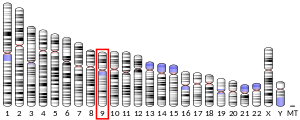IFNA5
Appearance
Interferon alpha-5 is a protein that in humans is encoded by the IFNA5 gene.[5][6]
References
- ^ a b c GRCh38: Ensembl release 89: ENSG00000147873 – Ensembl, May 2017
- ^ a b c GRCm38: Ensembl release 89: ENSMUSG00000063376 – Ensembl, May 2017
- ^ "Human PubMed Reference:". National Center for Biotechnology Information, U.S. National Library of Medicine.
- ^ "Mouse PubMed Reference:". National Center for Biotechnology Information, U.S. National Library of Medicine.
- ^ Olopade OI, Bohlander SK, Pomykala H, Maltepe E, Van Melle E, Le Beau MM, Diaz MO (Dec 1992). "Mapping of the shortest region of overlap of deletions of the short arm of chromosome 9 associated with human neoplasia". Genomics. 14 (2): 437–43. doi:10.1016/S0888-7543(05)80238-1. PMID 1385305.
- ^ "Entrez Gene: IFNA5 interferon, alpha 5".
Further reading
- Henco K, Brosius J, Fujisawa A, et al. (1985). "Structural relationship of human interferon alpha genes and pseudogenes". J. Mol. Biol. 185 (2): 227–60. doi:10.1016/0022-2836(85)90401-2. PMID 4057246.
- Goeddel DV, Leung DW, Dull TJ, et al. (1981). "The structure of eight distinct cloned human leukocyte interferon cDNAs". Nature. 290 (5801): 20–6. doi:10.1038/290020a0. PMID 6163083. S2CID 1900300.
- Tiefenbrun N, Melamed D, Levy N, et al. (1996). "Alpha interferon suppresses the cyclin D3 and cdc25A genes, leading to a reversible G0-like arrest". Mol. Cell. Biol. 16 (7): 3934–44. doi:10.1128/MCB.16.7.3934. PMC 231390. PMID 8668211.
- Chuntharapai A, Gibbs V, Lu J, et al. (1999). "Determination of residues involved in ligand binding and signal transmission in the human IFN-alpha receptor 2". J. Immunol. 163 (2): 766–73. PMID 10395669.
- Strausberg RL, Feingold EA, Grouse LH, et al. (2003). "Generation and initial analysis of more than 15,000 full-length human and mouse cDNA sequences". Proc. Natl. Acad. Sci. U.S.A. 99 (26): 16899–903. doi:10.1073/pnas.242603899. PMC 139241. PMID 12477932.
- Humphray SJ, Oliver K, Hunt AR, et al. (2004). "DNA sequence and analysis of human chromosome 9". Nature. 429 (6990): 369–74. doi:10.1038/nature02465. PMC 2734081. PMID 15164053.
- Zhang Z, Henzel WJ (2005). "Signal peptide prediction based on analysis of experimentally verified cleavage sites". Protein Sci. 13 (10): 2819–24. doi:10.1110/ps.04682504. PMC 2286551. PMID 15340161.
- Gerhard DS, Wagner L, Feingold EA, et al. (2004). "The status, quality, and expansion of the NIH full-length cDNA project: the Mammalian Gene Collection (MGC)". Genome Res. 14 (10B): 2121–7. doi:10.1101/gr.2596504. PMC 528928. PMID 15489334.





